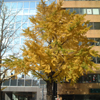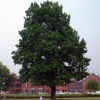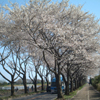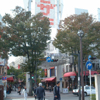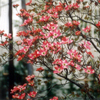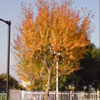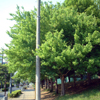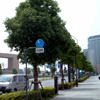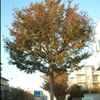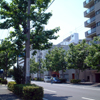Here's the text.
Type of street trees
Last Updated November 14, 2024
Introduction of typical tree species
On the road in Yokohama City, there are various street trees (Takagi planted on sidewalks, median strips, environmental facilities, etc.). I would like to introduce some of them.
| Tree common name | Photographs of trees | Representative places and comments |
|---|---|---|
| Ginkgo |
| Because the yellow leaves are beautiful and resistant to pests, air pollution, and pruning, it is the most commonly planted street trees in Japan. The female tree has "Ginnan", but we try to plant male trees that are not fruitful in recent street trees. A row of trees in Yamashita-koen-mae and Nihon Odori Avenue in Naka Ward is famous. |
| Lilywood |
| It is native to North America and grows quickly and becomes a large tree. Because the shape of the leaves resembles a hanten, it is also called "Huntenboku", and it is named "Tulip Tree" in English because of the shape of the flower. |
| Sakura |
| In addition to the typical Yoshino cherry tree, there are also those that bloom in early spring and those that bloom in double bloom. The beauty of flowers is exceptional, but the difficulty is that they are vulnerable to pruning and pests. It doesn't seem to be suitable for narrow and harsh street trees. There is a row of trees that have been popular for a long time on the promenade along rivers such as the Ookagawa and Kashio River. |
| Zelkova |
| Since it becomes a large tree, it becomes a beautiful tree shape if it can be grown in a large place. You can see stunning rows of trees on Mitakedai and Moegino in Aoba-ku, Nakata Sachigaoka Line in Izumi Ward (from Okazu-cho to Nakata-Higashi 1-chome) and Nomidai in Kanazawa-ku. |
| Dogwood |
| Native to North America. The flowers bloom following the cherry blossoms, and the red fruits and autumn leaves are beautiful, so the number of street trees is increasing nationwide, but it is weak in drying, Japanese heat, and pruning. It appears around Azamino, Aoba-ku, Hirato-Sakuragi Road] in Minami Ward (Minamiota 3-chome to Rokutsugawa 1-chome), and everywhere in the city. |
| Red maple |
| As the name suggests, it is native to China. Because it is a friend of maple, the autumn leaves are beautiful. It is a row of trees in Susukino-Azamino, Aoba-ku, Rokutsugawa, Minami-ku, Futamatagawa 1-chome, Asahi-ku, Shodo, Sakae-ku, etc. |
| Shrub |
| In early spring, the origin of the name is that small red flowers bloom in front of the new leaves. The autumn leaves are also beautiful maple trees. It has been planted for a long time in Mishigaoka, Aoba-ku, Tsunashima Nishi, Kohoku-ku, Maioka-cho, Totsuka-ku, and Hikiyama, Konan-ku. |
| Camphor tree |
| In winter, it is an evergreen tree with leaves and becomes a large tree. Shono is taken and has been used in various ways since ancient times. Kokusai Odori Boulevard (Minamirai 5-chome, Nishi-ku, Shinko 1-chome, Naka-ku), Kaminomachi, Sakae-ku, Konandai, Konan-ku, and Kohoku New Town, Tsuzuki Ward . |
| Aquinile |
| It is named because it is a friend of leek that produces flowers and fruits in autumn. Small and fine branches and leaves give a light impression, and withstands dry thin fabric. It is planted in Basyamichi Naka Ward, and is often found in Kohoku New Town, such as 1-chome Higashiyamada, Tsuzuki-ku and Higashigatacho. |
| Platanus |
| It is a general term for Suzukakenoki friends who came to the end of the Meiji era, and there are three types in Japan. It is planted as street trees around the world, and in the past it was planted a lot in the city, but it has not been planted much in recent years because it grows very fast and pests are likely to occur. |
In addition, there are maple buff, shirakashi, yamaboushi, wig, black mochi, etc.
※The main street tree lines, tree species, etc. are listed on the "Yokohama City Park Green Space Map" (Environmental Planning Bureau) sold at the City Hall 3F "Citizen Information Center".
Inquiries to this page
Road and Highway Bureau Road Department Facilities Division
Telephone: 045-671-2786
Telephone: 045-671-2786
Fax: 045-550-3376
Email address: do-shisetsu@city.yokohama.lg.jp
Page ID: 270-303-758


